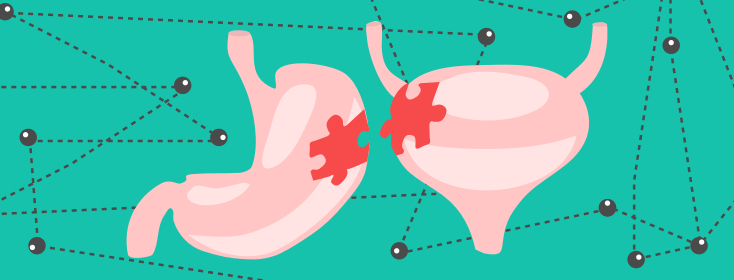The Connection Between IBS and Bladder Problems
Last updated: March 2023
If you have IBS, you may know that you have an increased risk of also having other diseases. In addition, researchers now understand that people of all genders have an increased risk of a variety of urinary problems. Urinary problems that can occur with IBS include overactive bladder (OAB), interstitial cystitis, and chronic prostatitis.1
Overactive bladder syndrome
People with OAB experience symptoms such as urgency, increased frequency of urination, the need to urinate frequently at night, and incontinence. OAB is a diagnosis of exclusion. This means it is diagnosed when other explanations of these symptoms have been ruled out.2,3
In people who experience urinary urgency with OAB, this may be due to dysfunction in the muscles of the pelvic floor. In pelvic floor dysfunction, the muscles that control the bladder and colon are not working properly.2,3
Interstitial cystitis
Interstitial cystitis is also known as painful bladder syndrome. People with interstitial cystitis report frequent urination, chronic bladder discomfort, and pain.4,5
Urinary problems
People with IBS who have prostates are at increased risk for chronic prostatitis, which causes pain in the lower pelvic region. Symptoms include:6
- Urinary pain
- Pain upon urination
- Urgency
- Increased frequency
- Incontinence
While current clinical studies do not support an increased risk of urinary tract infection (UTI) in women with IBS, 1 study found that women with IBS are at increased risk (3-fold or more) for several symptoms that are common with a UTI. These include urinary frequency, urinary urgency, and painful or difficult urination.1
Bladder treatments
If you experience urinary symptoms, be sure your doctor is aware of all of your symptoms so they can do the appropriate follow-up. They may make behavioral recommendations and prescribe drugs as needed.
Overactive bladder treatment
First-line treatment of OAB includes behavior changes that could include pelvic floor muscle exercises (Kegel exercises), maintaining a bathroom schedule, and bladder training.3
Kegel exercises strengthen the muscles of the pelvic floor and can lead to improved control of the urinary sphincter. This is the muscle that must relax in order to urinate. If you can contract your pelvic floor muscles, training your bladder to cope with small delays in going to the bathroom may help with the urgency problem.3
Anticholinergic drugs can treat both IBS and overactive bladder. Acetylcholine is a neurotransmitter that plays an important role in neuronal transmission to smooth muscles that control both the intestines and urinary tract. One drug in this class (Oxytrol) is available over the counter for women.3,7
In some cases, a tricyclic antidepressant may be prescribed to relax the bladder muscles. Finally, in people who are not successful with behavioral and oral medicines, Botox may be used to help relax the bladder muscle.3,7
Interstitial cystitis treatment
Physical therapy can help relieve pelvic pain associated with interstitial cystitis.5
Nerve stimulation, such as with a transcutaneous electrical nerve stimulation (TENS) unit or with a sacral nerve stimulation device, may help with muscular control and pain management.5
Oral medicines to treat interstitial cystitis include:5
- Antihistamines
- Nonsteroidal anti-inflammatory drugs (NSAIDs)
- Tricyclic antidepressants
- Elmiron®
Chronic prostatitis treatment
Many treatments for chronic prostatitis are oral medicines. Antibiotics can be used for people who had a UTI before chronic prostatitis. Other therapies include anticholinergic drugs and alpha-blockers. Alpha-blockers are drugs that block adrenergic receptors and result in relaxation of smooth muscle.6
Community Poll
Does your IBS prevent you from attending public events?

Join the conversation